In Case of an Electrical Emergency
Electrical Fires
Fires that involve electrical appliances, outlets, or cords are different from other fires. Because water conducts electricity, throwing water on an electrical fire can spread the fire and create a shock hazard. Electricity can travel through the water to you.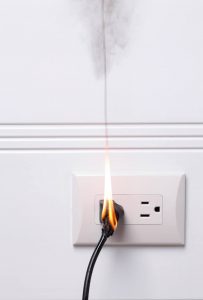
Never use water on an electrical fire! Here is what to do instead:
- If the fire can be put out safely, use a proper chemical fire extinguisher.
- If the fire cannot be put out safely, leave the house and do not go back inside.
- Call 911 and tell them it is an electrical fire.
Electric Shock
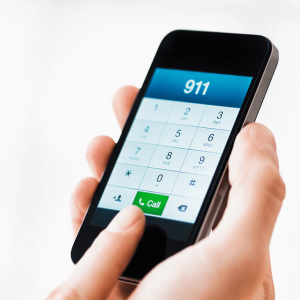 If someone has been severely shocked and is apparently injured and unable to move, there’s a chance they may still be in contact with the source of the electricity. Do not touch the shock victim or anything they are touching. You could be shocked as well, or even killed.
If someone has been severely shocked and is apparently injured and unable to move, there’s a chance they may still be in contact with the source of the electricity. Do not touch the shock victim or anything they are touching. You could be shocked as well, or even killed.
Take these steps:
- Turn off the electricity at the circuit breaker or fuse box.
- Call 911 and tell the operator there has been an electrical accident.
- When you’re sure the victim is not in contact with the source of electricity and there is no danger, give first aid. Check for signs of circulation (breathing, coughing, or movement). If absent, begin cardiopulmonary resuscitation (CPR) immediately.
- Prevent shock. Lay the person down and, if possible, position the head slightly lower than the trunk with the legs elevated. Don’t touch burns, break blisters, or remove burned clothing.
- Be sure the victim gets medical attention as soon as possible. Electric shock may cause burns inside the body.
Downed Power Lines
When out driving or walking, be especially alert for downed power lines after storms or high winds.
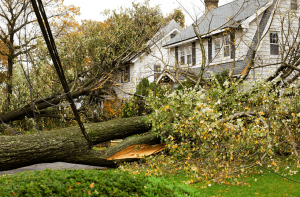
Be especially alert for downed power lines after storms or high winds.
Shock from downed power lines can injure or kill you, even if the line does not spark or hum. If you see a downed power line, keep your distance. Be especially careful if it has been raining and there is water on the ground. Do not get close to anything that is touching the line, like a tree, fence, or vehicle. Immediately call 911 and {Utility Name} to report the line.
Vehicle/Power Line Incidents
If a power line falls on or near your vehicle, take these steps: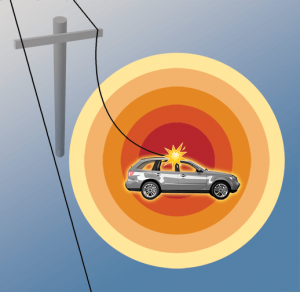
- Warn other people to stay away. Call out if you can safely open a window, or wave them away with hand gestures. If you have a working mobile phone, call 911 or {Utility Name} for help. If you don’t have a working phone, call out to a passerby and ask them to make the call.
- If possible, stay in the car until rescue workers arrive. You are safe from electric shock inside the car.
- If you must leave the car because of fire or other danger, do not step out of the car. If you touch the car and the ground at the same time, you will be shocked. Instead, jump away from the car so that no part of you touches the car and the ground at the same time. Land with your feet together, then shuffle away, keeping both feet on the ground.
- Do not try to help someone else from the car while you are standing on the ground. If you do, you will become a path for electricity and could be severely injured or killed.
Even after you’ve successfully jumped from a car with a power line on or near it, the danger may not be over. Electricity can spread out through the ground in a circle from any downed line. The voltage drops as you move away from the point of contact. If one part of your body touches a high-voltage zone while another part touches a low-voltage zone, the current can flow through you, giving you a potentially deadly shock. That’s why you should shuffle away from the line, keeping your feet close together.
Power Outages
Outages can last several hours or even several days, so make a safety kit. Put the items below in your kit to keep your family comfortable and healthy during a power outage.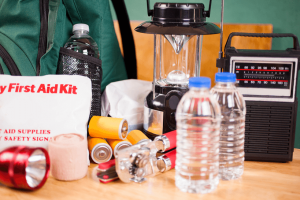
- Flashlights (battery-powered or windup)
- A battery-powered radio
- Extra batteries for flashlights and radio
- A three-day supply of bottled water
- Canned and dried foods enough for three days
- A manual can opener
- Blankets
- First aid supplies
Replace batteries, food, and water once a year. Make sure everyone in your family knows where the kit is stored.
Outage Safety Checklist
Print the Outage Safety Checklist to keep on hand in case your power goes out.
Lightning
If an electrical storm is coming or underway, stay indoors. Lightning can travel through wires and pipes, so keep away from windows, wiring, and plumbing. Stay indoors for 30 minutes or more after you hear the last thunder.
If you are outside when a storm comes, get indoors as soon as you can. You are safest in an enclosed building.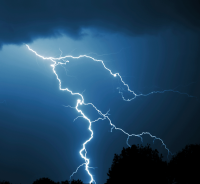
If you can’t get indoors:
- Get into a hardtop car, not an open vehicle. Close the windows.
- Avoid trees, other tall objects, and anything metal, such as flagpoles, metal bleachers, golf clubs, or tall light poles. Lightning tends to ground itself through the nearest electrical conductor, either because the object is tall (like a tree) or because it conducts really well, like the metal on an umbrella.
- Stay away from rivers, lakes, and swimming pools. If you are boating, head to shore. If you’re swimming, get out of the water as fast as you can.
- Avoid wide-open areas, including sports fields. Without other tall objects nearby, you have a greater chance of being struck by lightning.
